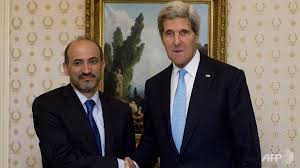 International backers of Syria’s fractious opposition warned rebel political leaders Sunday that upcoming negotiations for a transition government to replace President Bashar al-Assad may be their last, best hope to bring their country’s civil war to an end.
International backers of Syria’s fractious opposition warned rebel political leaders Sunday that upcoming negotiations for a transition government to replace President Bashar al-Assad may be their last, best hope to bring their country’s civil war to an end.
With less than two weeks to go before a United Nations-sponsored negotiating conference in Geneva, the U.S.-backed Syrian Opposition Coalition has yet to say that it will attend. Amid rising frustration among its supporters, the group’s attempts to come to agreement and appoint a delegation have repeatedly broken down.
Coalition president Ahmed al-Jarga was recently reelected in a race that further split the political opposition. In meetings here with delegates, including Secretary of State John F. Kerry and foreign ministers from 10 other European and Arab countries, Jarga said that some opposition leaders remain suspicious that the United States and others can be depended upon to force Assad from power through a political agreement.
Speaking after the meeting, French Foreign Minister Laurent Fabius emphasized that the donor’s group was committed to “putting an end to the present [Assad] regime.”
In a formal statement, the countries known as the London 11, for the city where they first met in the early days of a Syrian civil war, said that “as long as . . . Assad remains in power, there is no prospect of peace and stability in Syria and the region.”
Ahmed is expected to take the statement back to the coalition, which to meet again Friday to consider attendance.
“I’m confident, personally . . . that the Syrian opposition will come to Geneva,” Kerry said in a news conference with Qatari Foreign Minister Khaled bin Mohammed al-Atiya. He said the opposition “understands the stakes.”
The Geneva conference, scheduled for Jan. 22 in Switzerland, is to implement an agreement reached 18 months ago by a larger group of outside countries — including Russia, one of Assad’s main backers — calling for a transition government to be established in Syria through a negotiated settlement between the parties to the conflict there.
Conference delegations are to be chosen by “mutual consent,” which the opposition and its backers have said means Assad can neither attend, nor remain in office. Assad, Russia and Iran, his other principal supporter, have said barring Assad from future power is an unacceptable “precondition” to the talks, although the government has agreed to attend.
The diplomacy came as fighting continued to rage between rebels and fighters with the al-Qaeda-affiliated Islamic State of Iraq and Syria across most areas of northern Syria that are under opposition control.
At least 697 people have been killed in the 10 days since the clashes erupted between the two factions, according to figures published Sunday by the Britain based Syrian Observatory for Human Rights. Most of the dead were combatants, but at least 100 were civilians, including 21 activists who had been imprisoned by ISIS and were executed in Aleppo before the group lost control of its headquarters there.
The bodies of 11 more people who had been handcuffed and shot in the head were uncovered on Sunday at another ISIS base captured by rebels in Aleppo. The Islamist Ahrar al-Sham, which has played a prominent role in the anti-ISIS revolt, said on its Twitter account that as many as 100 of its fighters were killed Sunday in the eastern provincial capital of Raqqa.
Dozens of people were also reported killed in attacks by government forces against a variety of rebel-held areas around the country, including 21 who died when airplanes dropped explosive barrels onto the Aleppo province town of al-Bab.
Kerry said that the United States was moving toward a resumption of non-lethal military assistance to moderate opposition forces in northern Syria. The aid was suspended late last year after ISIS fighters took over a warehouse on the Turkish border where aid to U.S.-backed rebel groups.
On Wednesday, Kerry will attend a conference of humanitarian donors to Syria, where he said the war had created 8 million displaced people, and more than 2 million refugees who have fled the country.
Although the Obama administration is expected to pledge more money, Kerry said that “the best solution to the humanitarian crisis is to get a political solution and end the creation of more refugees. . . . We are not looking for a policy of simply increased assistance to refugees,” Kerry said. “We are looking for a policy that saves Syria.”
Washington Post

Leave a Reply
You must be logged in to post a comment.